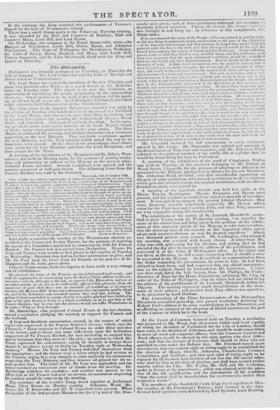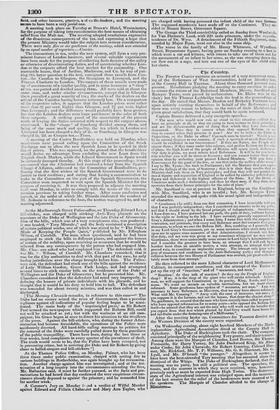At the Court of Common Council held on Tuesday, a
resolution was proposed by Mr. Wood, that all persons within each ward capable of voting for Members of Parliament for the City of London, should have votes in the election of Aldermen, and should be made compellable to serve all ward and corporate offices; that the Common Council end Ward officers should be elected by the same parties who elect Alder- men; and that the electors of Common Hall should be those who are qualified to vote under the Reform Act. Mr. Pritchard moved as an amendment, that one uniform right of voting ought to be established for the election of Mayor, Sheriffs, Aldermen, Chamberlain, Ccmmon Councilmen, arid Auditors ; and that such right of voting ought to be enjoyed by all freemen, householders of not less that 10/. annuul stable, who shall be free at the time of election, and shall have resided twelve months within the City. Mr. Taylor, Mr. Hall, and Mr. Galloway, spoke in fevour of the amendment • which was adopted, with the omis- sion of the la qualification, and the introduction of the condition "that the voters shall be householders for twelvemonths within their respective wards."
The members of the Smithfield Cattle Clob dined together on Mon- day evening, at the Freemason's Tavern ; Earl Spencer in the chair. Several brief speeches were delivered by Earl Spencer, Lord Hunting
Bel& are other tanners, prazieis, a id ciatle-feeders ; and the meeting maws to have been a very jovial one.
A meeting took place on Tuesday at Brown's Hotel, Westminster, for the purpose of taking into consideration the best means of obtaining srelief (ruin the Malt-tax. The meeting adopted resolutions expressive et the disastrous consequences of the tax, and expressing a hope that the present Ministry would take the subject into serious consideration. There were only five or six gentlemen at the meeting, which was attended iy ars equal number of reporters.— Courier.
The transactions in tea, under the new system, still form a very pro- minent feature of London business, and several valuable experiments hove been made for the purpose of collecting facts decisive of the utility or otherwise of discriminating duties, and of ascertaining whether Lon- a= or the outports afford the best market for the commodity. One meecantile house, that of Jardine, Mathieson, and Co. by way of put- ting this latter question to the test, consigned three vessels from Can- t ren—the Camden to Glasgow, the Georgiana to Liverpool, and the Fa-cites Charlotte to London. The cargoes of these vessels were made srp ef assortments of a similar quality, and in some instances a " chop " a tea was parted and divided among them. All were sold at about the mane time, and under similar circumstances, except that in Glasgow there prevailed a great scarcity of tea ; the stocks of the dealers on the arriral of the Camden having become extremely low. On a comparison cif the respective sales, it appears that the London prices were rather mare than 3,4 per cent. higher than Glasgow, anti 71 per cent, higher than Liverpool ; and the difference would probably have been greater, bet that the London dealers were large purchasers at the sales of both alasse outports. A striking proof of the uncertainty of the present trasie of levying the duties occurred with respect to the cargoes above- ansanoned. In the " chops " of Souchong divided among them, and 'ss; of the same mark and quality, the tea which in London and Liverpool has been charged a duty of 2s. as Souchoeg, in Glasgow was esh,uged 2s. '2d. as Congou tea.— Times.
A meeting of the Cortes Bondholders was held on hIonday, when naubstions were passed calling upon the Committee of the Stock Exehange not to allow the new Spanish Loan to be quoted in their list of prices. This was opposed, on the ground that the bondholders srauld derive no advantage from excluding the new Loan from the Enlish Stock Market, while the Liberal Government in Spain would he seriously damaged thereby. At this stage of the proceedings, it was anceunced that the Chairman bad received a letter from the Spanish Charge d'Affaires, addressed to the Committee of Bondholders, pro- fessing that the first wishes of the Spanish Government were to do 3nistice to their creditors; and stating that having a communication to make to the Committee on the part of the Spanish Government, the Cammittee were requested to wait upon the Spanish Minister for the paapase of receiving it. It was then proposed to adjourn the meeting esan11 next Monday, in order to comply with the terms of the commu- nisation previous to taking further steps. After some confusion and ivanult, in the midst of which Mr. Ricardo vindicated the conduct of M. Ardouin in reference to the loan, the motion was agreed to, and the matting adjourned.



















 Previous page
Previous page